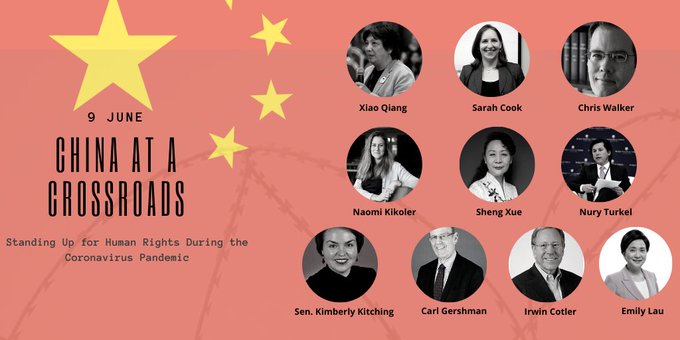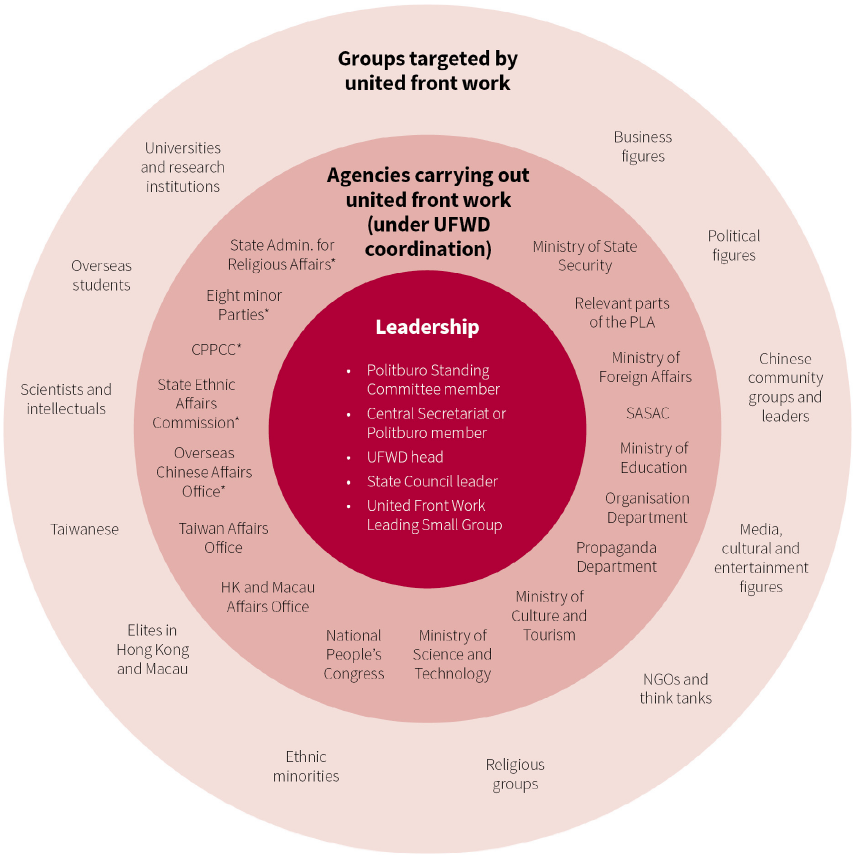
China is making fresh efforts to influence Chinese communities around the world to advance Beijing’s interests, requiring heightened vigilance from democratic countries, a new study says. A unit in China’s ruling Communist Party known as the United Front Work Department engages thousands of organizations to collect intelligence, encourage technology transfer, counter dissident movements and generate support for other Beijing objectives, said the report (see below) by the nonpartisan Australian Strategic Policy Institute, The Wall Street Journal’s Kate O’Keefe reports:
The department focuses its influence operations overseas on Chinese diaspora communities and foreign elites, the report said. While Beijing has used the united front system for decades, President Xi Jinping renewed the department’s mission as part of a push to make China a global power. In recent years it has turned to increasing its control over Chinese- language media abroad, funding research at prominent think tanks and using China’s popular WeChat messaging platform and other social media to censor, surveil and shape dialogue on policy issues, it said.
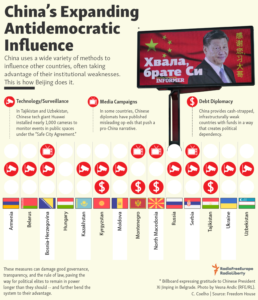
RFE/RL
In the latest manifestation of Beijing’s ‘wolf warrior diplomacy‘, China’s combative new messengers are also using Twitter, alongside a murky hallelujah chorus of sympathetic accounts which has emerged to repost them and cheer them on. Many of the accounts behaved with a single-mindedness that could suggest a coordinated campaign of the type that nation states have carried out on Twitter in the past, according to an analysis by The New York Times:
Of the roughly 4,600 accounts that reposted China’s leading envoys and state-run news outlets during a recent week, many acted suspiciously, The Times found. One in six tweeted with extremely high frequency despite having few followers, as if they were being used as loudspeakers, not as sharing platforms….The Times’s findings add to other recent evidence suggesting that Twitter is being manipulated to amplify pro-Beijing messages. Next Dim, a data firm in Israel, discovered two mundane-looking tweets praising China’s coronavirus response that were liked and reposted hundreds of thousands of times in March, possibly with the help of strategically placed influencer accounts. The U.S. State Department found inauthentic-seeming accounts that in April cited a Cambridge University study to raise doubts that the coronavirus originated in China.
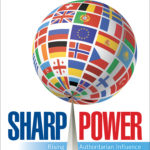
National Endowment for Democracy (NED)
The State Department denounced China’s efforts to burnish its image and drown out criticism during the pandemic, comparing them to Russia’s disinformation campaigns. Both countries are using a range of tools to “shape and tilt any given information environment in their favor,” said Lea Gabrielle, coordinator of the department’s Global Engagement Center, referring to what the National Endowment for Democracy (NED) calls Beijing’s ‘sharp power.’
“I think the Chinese Communist Party is still trying to define its relationship with Twitter,” said Kristine Lee, a fellow at the Center for a New American Security. “But the Covid-19 pandemic has served as an important period of experimentation,” she told The Times.
The Chinese Communist Party (CCP) is strengthening its influence by co-opting representatives of ethnic minority groups, religious movements, and business, science and political groups. It claims the right to speak on behalf of those groups and uses them to claim legitimacy, says analyst Alex Joske.
These efforts are carried out by the united front system, which is a network of party and state agencies responsible for influencing groups outside the party, particularly those claiming to represent civil society. It manages and expands the United Front, a coalition of entities working towards the party’s goals. The CCP’s role in this system’s activities, known as united front work, is often covert or deceptive, he writes in a must-read report for the Australian Strategic Policy Institute:
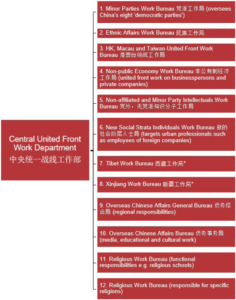 The united front system’s reach beyond the borders of the People’s Republic of China (PRC)—such as into foreign political parties, diaspora communities and multinational corporations—is an exportation of the CCP’s political system. This undermines social cohesion, exacerbates racial tension, influences politics, harms media integrity, facilitates espionage, and increases unsupervised technology transfer.
The united front system’s reach beyond the borders of the People’s Republic of China (PRC)—such as into foreign political parties, diaspora communities and multinational corporations—is an exportation of the CCP’s political system. This undermines social cohesion, exacerbates racial tension, influences politics, harms media integrity, facilitates espionage, and increases unsupervised technology transfer.
Responses to united front work must engage governments, civil society and ethnic Chinese communities, Joske adds:
They should seek to couple punitive measures for agents of interference with a positive agenda of support for and engagement with communities affected by united front work. Effective efforts to counter foreign interference are essential to protect genuine participation in politics by ethnic Chinese citizens. Counter-interference work can complement engagement with the PRC when carried out properly by helping to ensure that it aligns with national interests and isn’t used as a platform for interference.
This report recommends that governments pursue a number of measures, including….RTWT Download
The Raoul Wallenberg Centre for Human Rights will be hosting a major online conference on Tuesday, June 9 from 5:00-8:00PM EDT bringing together some of the world’s leading voices to address human rights in China during the Coronavirus pandemic.
The webinar will consist of three panels: China’s attempt to quarantine the truth and increasing threats against the media and journalists; China’s political prisoners and mistreatment of minorities; and identifying ways to hold the Chinese government accountable for the pandemic and human rights abuses.
China at a Crossroads: Standing up for Human Rights During the Pandemic
Program:
1) China’s attempt to quarantine the truth and increasing threats against the media and journalists
Moderator: Judith Abitan, Raoul Wallenberg Centre for Human Rights (RWCHR)
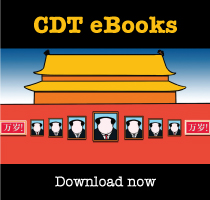 – Xiao Qiang, Director and Research Scientist at Counter-Power Lab at UC Berkeley, Founder and Editor of China Digital Times
– Xiao Qiang, Director and Research Scientist at Counter-Power Lab at UC Berkeley, Founder and Editor of China Digital Times
– Sarah Cook, Senior Research Analyst for China at Freedom House and Director of China Media Bulletin
– Chris Walker, Vice President, Studies and Analysis, National Endowment for Democracy
2) China’s political prisoners and mistreatment of minorities
Moderator: Kyle Matthews, Montreal Institute for Genocide Studies and Human Rights (MIGS)
– Jewher Ilham, Human rights activist and author whose father, an Uyghur scholar, is detained by the Chinese state
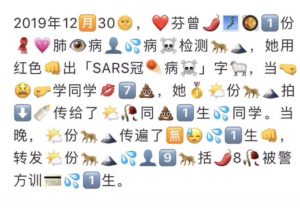
Credit: FreedomHouse
– Naomi Kikoler, Director of the Simon-Skjodt Center for the Prevention of Genocide at the US Holocaust Memorial Museum
– Emily Lau, Journalist and First Woman elected to the Hong Kong Legislative Council
3) Identifying ways to hold the Chinese government accountable for the pandemic and human rights abuses
Moderator: Terry Glavin, journalist and RWCHR Senior Fellow
– Kimberly Kitching , Australian Senator and Chair of the Foreign Affairs, Defence and Trade References Committee
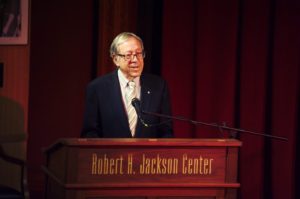 – Irwin Cotler, (right), Chair of the Raoul Wallenberg Centre for Human Rights, Former Minister of Justice and Attorney General of Canada and longtime Parliamentarian
– Irwin Cotler, (right), Chair of the Raoul Wallenberg Centre for Human Rights, Former Minister of Justice and Attorney General of Canada and longtime Parliamentarian
– Carl Gershman, President of National Endowment for Democracy
– Sheng Xue, Chairperson of International Federation for a Democratic China
Registration for the event is required: Click Here
This event is hosted and co-sponsored by the Montreal Institute for Genocide and Human Rights Studies, Freedom House, the National Endowment for Democracy, China Digital Times, the Geneva Summit for Human Rights and Democracy, the Uyghur Rights Advocacy Project, Canada Tibet Committee, International Coalition to End Transplant Abuse in China, the Federation for a Democratic China and the Nobel Women’s Initiative.
